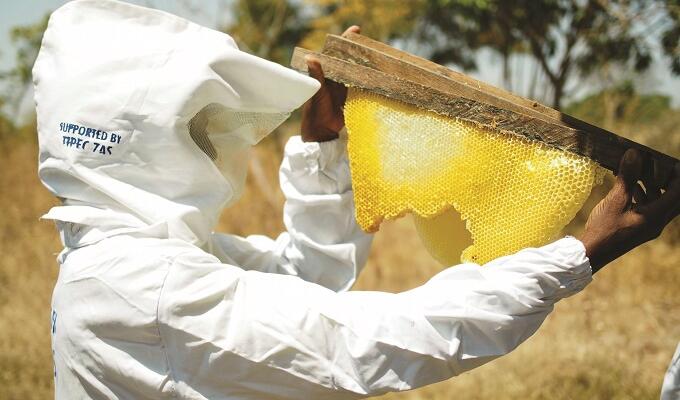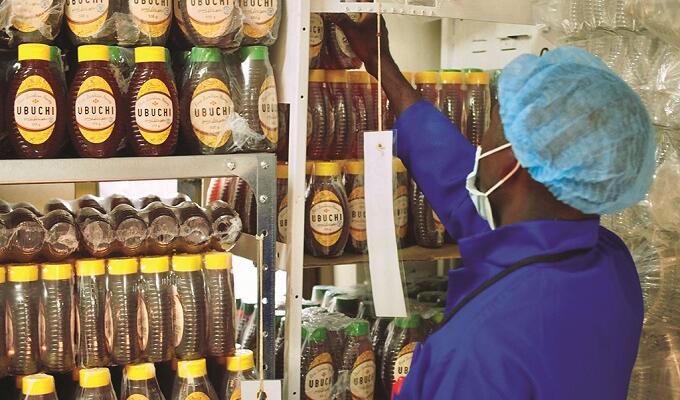


Zambia’s trade ambitions abuzz – with honey
From improved quality to better sales connections to streamlined processing, a range of efforts means more income
There are not a lot of opportunities for income in rural Zambia, a sad fact that is especially true for women.
To earn extra money, approximately 30,000 Zambians practice a traditional form of beekeeping. This is done mostly by men as the customary bark hives are placed high in trees and require climbing to harvest.
But now, after the Zambian government identified honey as a priority sector to diversify an economy largely dependent on copper exports, there are a host of new income opportunities for women and small businesses. Export figures indicates that the country’s honey exports have increased by 700% over the last five years.
‘In the honey sector in Zambia there was a lot of space to make an impact as beekeepers weren’t producing as much as they could, and were less connected to buyers,’ said Enhanced Integrated Framework (EIF) coordinator Simon Hess, who manages EIF’s work with the country’s honey sector. ‘On the other side, local processors needed support with food safety requirements and access to export markets.’
Following complementary supply and marketing efforts by EIF and the International Trade Centre (ITC), respectively, beekeeper productivity increased, honey quality improved, food safety certifications (HAACP) were obtained and new international buyers were secured.
‘This is pro-poor work that benefits women, small businesses and the environment as well,’ said ITC’s Kevin Musa, who managed ITC’s interventions in Zambia. ‘Our efforts on the marketing side, with the complementarity of EIF’s on the supply end, addressed the entire honey value chain for best results, and the path is set.’
Over five years the Government of Zambia, EIF and SNV, a Dutch non-governmental organization, worked around 6,000 beekeepers, or approximately 20% of the estimated total beekeepers in the country.
One crucial goal was to increase the amount of honey being produced. To do so, 5,000 harvesting buckets were distributed to address a collection challenge. In addition 1,139 modern hives were supplied to beekeepers together with training programmes, resulting in improved honey quality and quantity.
Armed with modern hives that don’t require an arduous climb to harvest them, women can now fully participate in beekeeping activities.
The partnership supported the creation of the Kabule Women’s Group, a cooperative of female beekeepers in Kapiri Mposhi, a town north of the capital Lusaka. Kabule received 150 modern hives and went from producing 45 buckets of honey to 300.
‘With the new hives and training, the Kabule group quickly increased the amount of honey they had to sell and we saw similar success with the other beekeepers we worked with,’ Hess said. ‘The Kabule women are now talking of branching out into creating their own honey products, so they are really inspired.’
Farther along the honey path, another point of intervention addressed the trifold issues of storage, transportation and sales.
The solution was 18 collection centres constructed across the country to house freshly collected honey, offer a point of purchase between beekeepers and processors and alleviate the sometimes prohibitive cost of getting honey from rural areas to those who want to buy it.
In addition, new connections were forged between honey sellers and buyers. For the Kabule women, that translated into their entire harvest selling to Lusaka-based Luano Honey, which gained high-quality honey directly from the source.
Another processor, Adcom Investments, is now connected to 4,000 honey suppliers throughout Zambia as a result of its work with ITC.
’Once production increases, markets can be found more easily, which results in greater income and profits for processors and the suppliers,’ ITC’s Musa said. ‘We focused on standards and creating market linkages so processors were exposed to international buyers.’
To ease that point along honey’s journey to stores across the globe, ITC, through its project financed by the Government of Finland, worked with Zambia’s honey processors, small businesses that had previously been focusing only on the local market.
‘We saw that a major barrier was food safety certification, so we offered trainings so processors could obtain them as they are necessary for export,’ Musa said.
Adhering to strict requirements on storage and handling, six small businesses in Zambia have received HAACP food-safety certification as a result of ITC’s efforts. Some have new buyers in the European Union and South Korea because of it.
They also have contemporary packaging materials and links to the patent office to register trademarks so their honey brands are prepped and ready for supermarket shelves.
From newly empowered beekeepers to stronger links to small business buyers to branding primed for the international market, the people making honey in Zambia are in business and the country’s honey export growth indicates as much.
ITC and EIF recently launched a new partnership in Zambia as part of ITC’s SheTrades initiative and the results of these mutual honey-sector efforts will inform the work, with the goal to support and empower more Zambian women to participate in business and trade.
‘This work to support Zambian honey has shown how effective collaboration and coordination can result in benefits along the entire supply and demand path,’ EIF’s Hess said. ‘The outcomes are clear.’



